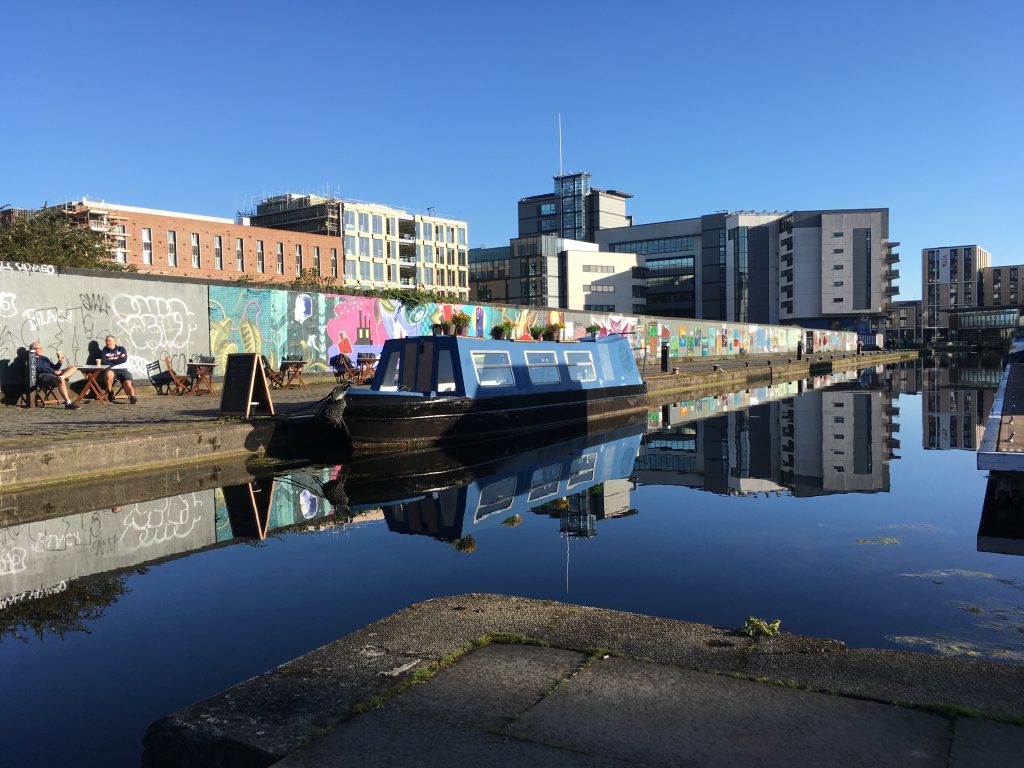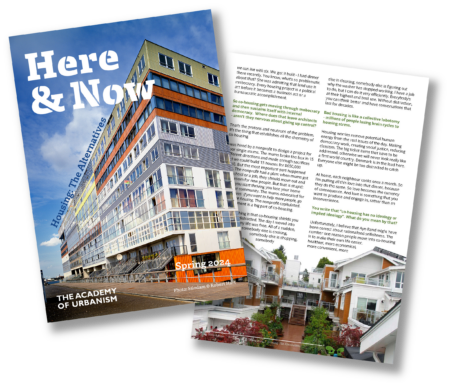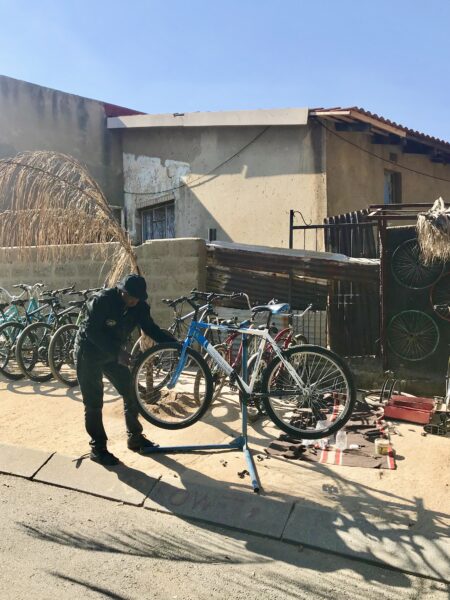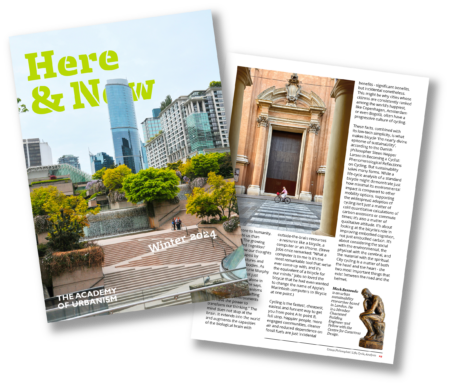This year’s Congress may have been virtual but an innovative approach to the study tours meant that you felt you were almost there. Heather Claridge AoU describes some of the highlights and lessons learnt.
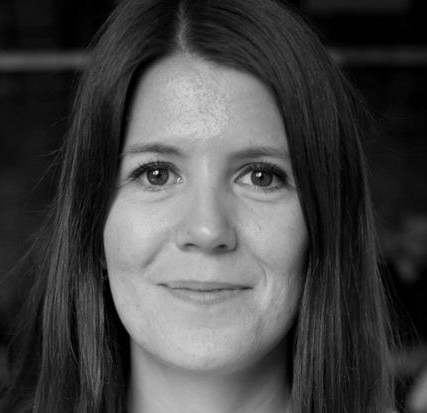 Travelling through Edinburgh’s West End, we arrive at Fountainbridge, a former brewery site beside the Union Canal. Over the last decade the area has been transformed into a contemporary mixed-use neighbourhood and as we walk through its streets we stop and chat to a resident and hear from the people responsible for the area’s planning. It’s easy to forget this is the heart of the Scottish Capital, with leisure cyclists rolling past, a row of charming houseboats moored to the canal edge and the sun reflecting off the water. I feel like I am there. It’s just that I’m not, I am watching from my own chair many miles away, as are the other delegates at this year’s online Congress.
Travelling through Edinburgh’s West End, we arrive at Fountainbridge, a former brewery site beside the Union Canal. Over the last decade the area has been transformed into a contemporary mixed-use neighbourhood and as we walk through its streets we stop and chat to a resident and hear from the people responsible for the area’s planning. It’s easy to forget this is the heart of the Scottish Capital, with leisure cyclists rolling past, a row of charming houseboats moored to the canal edge and the sun reflecting off the water. I feel like I am there. It’s just that I’m not, I am watching from my own chair many miles away, as are the other delegates at this year’s online Congress.
The Fountainbridge tour was one of four videos created by the City of Edinburgh and the AoU to provide an immersive experience to the online event. Others featured the New Town, Leith and the Royal Mile and together they told a compelling story of people, properties and spaces adapting under pressure – the central theme of Congress this year. The video tours were just one of the highlights of this extraordinary Congress programme on the 16th to 18th of June allowing me to be an armchair urbanist, learning what it takes to be a responsive city in a pandemic.
Days 1 and 2
After a convivial networking session on the first evening hosted by AoU Chair, Andrew Burrell and members of the Scottish AoU Advisory Group, the congress opened on Day 2 with a series of deep dives into Edinburgh and the key challenges facing the city. Paul Lawrence, Executive Director of Place at the Council, explained the need to rewrite the city’s narrative after the pandemic explaining that the city’s growth strategy was being changed to a prosperity strategy on the basis that growth was not always a good thing.
Each time I attend an AoU Congress I feel I gain a backstage pass to a city.
Staying with Edinburgh’s challenges, AoU Director Michelle Grant chaired an engaging session with Daisy Narayanan, Mobility and Placemaking Senior Manager from the City of Edinburgh Council, Christina Sinclair, Director of Edinburgh World Heritage and Hilary Kidd Director of Smart Services at Young Scot. Through layering the speakers’ perspectives, we learnt how public transport, the historic environment and younger generations play a critical role in redressing the city’s inequality and tackling the climate crisis. Later, Deputy First Minister of Scotland, John Swinney similarly suggests that Scotland’s recovery from Covid-19 will involve a multi-agency approach.
In the afternoon we explored the neighbourhoods of Portobello and Wester Hailes, very different places physically and socially but both of which have harnessed the energy and creative capital of the community to make place improvements. These examples provide strong lessons for elsewhere on incremental change leading to holistic area regeneration.
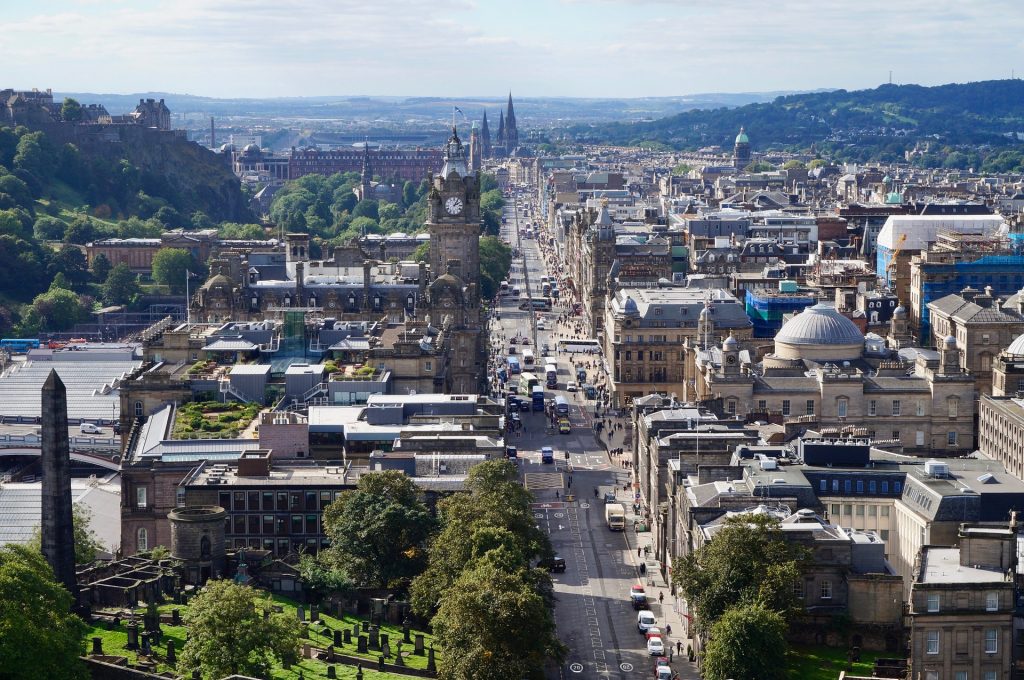
Day 3
Day 3 of Congress seeks-out international perspectives on the issues faced by our host city. This year’s event included speakers from Barcelona, Lisbon and Amsterdam – all facing similar challenges to the Scottish capital. We journeyed from the sub-surface to the rooftops of Amsterdam to understand how an integrated approach is aiding climate adaptation, energy transition and area densification. We explored the governance behind planning at a metropolitan scale in Lisbon and learnt about the tactical interventions being deployed in Barcelona during the pandemic, to humanise their superblocks.
In the next session the focus changed to the impact of behaviour and biology on the urban condition. Dr Ian Walker of the Department of Psychology at University of Bath sought to debunk the nudge theory of urban change arguing that more deliberate and radical action is needed to alter individual behaviour. Neuroscientist and Co-Founder of the Centric Lab, Araceli Camargo then explained the cause of biological inequality in cities and Peter Freeman, Co-founder, Argent Group and Chair, Homes England shared insight from a master-developer perspective.
A series of breakout workshops considered topics such as 20 minute neighbourhoods, City Centre transformation in a post-pandemic world, public space design for the LGBT+ community, transport resilience, place as a framework for investment, and finally Edinburgh’s relationship with the sea. Feedback from each workshop was shared with all the delegates in a session chaired by Young Urbanist, Julie Plichon.
Congress culminated with a keynote from Bart Somers, Vice minister-president in the Flemish Government and also Mayor of Mechelen, a small city between Brussels and Antwerp. The story of the town’s revival is inspiring as is the transformation in the attitudes of residents towards its immigrant population. In an era of increasing intolerance. The leadership, determination and empathy demonstrated by Mayor Somer gave us hope that urbanism really can make a difference and spotlighted the political characteristics needed to create a responsive city, one which can successfully adapt under pressure.
Each time I attend an AoU Congress I feel I gain a backstage pass to a city. For the few days we are immersed in a place. We meet with the stage-hands creating the policy frameworks, levering investment and managing stakeholders. We gain special access to areas undergoing significant change and peek behind the curtain to understand what it has taken to deliver. We hear from leading acts from other cities on new ideas or lessons learnt. This year the online format of Edinburgh Congress 2021 successfully maintained this sensation. Delegates came together, journeyed through neighbourhoods, studied past, present and future transformation and exchanged ideas. And whilst I would still opt to attend in person (like most of the delegates, I’m sure), the intelligent curation and high-quality digital experience of Congress meant that for once, I relished being an armchair urbanist.
There are many lessons to take away from the Edinburgh Congress on how to create a responsive city, one which is empathetic, equitable and climate ready. The notion of the great urban reset, once heralded at the beginning of the pandemic, seems to be diminishing in favour of a more sophisticated and sustained retuning of our urban conditions. While we never got to physically step foot in Edinburgh, I’m confident the city would extend a warm ‘Haste Ye Back’ to all the delegates.
Heather Claridge, AoU, Principal, Neighbourhoods, Regeneration and Sustainability, Glasgow City Council and co-chair of AoU Scotland Advisory Group.


